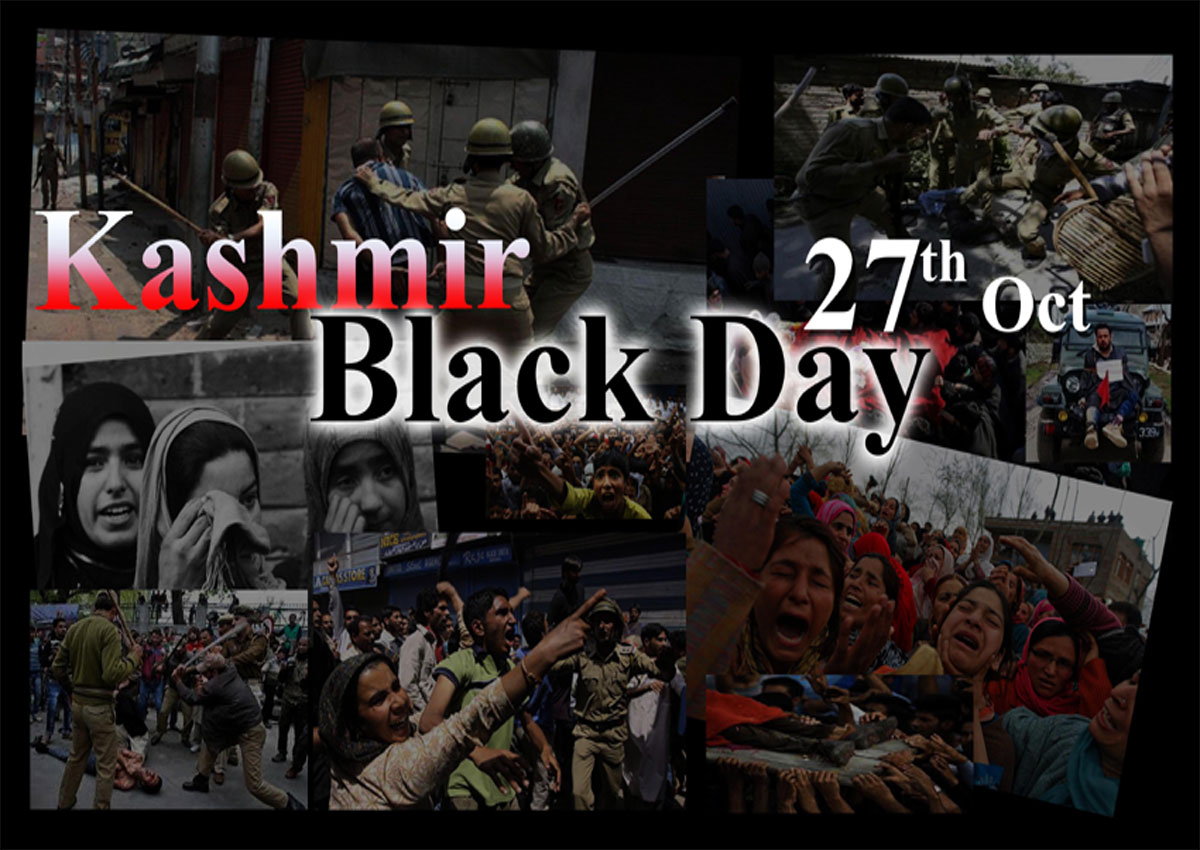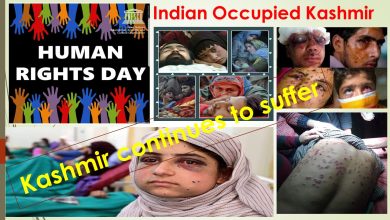Article: October 27: Observing Kashmir Black Day and advocating for right to self-determination
Mimoona Murtaza

 Each October 27, Kashmir Black Day is observed to commemorate the 1947 invasion by Indian troops, marking the beginning of the prolonged struggle for Kashmiris’ right to self-determination. This day symbolizes historical injustice and the resilience of those fighting for their rights. It serves as a call to action, urging the international community to recognize and address the ongoing oppression faced by Kashmiris. Events such as protests, seminars, and photographic exhibitions highlight human rights abuses and reaffirm support for Kashmir’s right to self-determination
Each October 27, Kashmir Black Day is observed to commemorate the 1947 invasion by Indian troops, marking the beginning of the prolonged struggle for Kashmiris’ right to self-determination. This day symbolizes historical injustice and the resilience of those fighting for their rights. It serves as a call to action, urging the international community to recognize and address the ongoing oppression faced by Kashmiris. Events such as protests, seminars, and photographic exhibitions highlight human rights abuses and reaffirm support for Kashmir’s right to self-determination
The dark legacy of the Jugular vein of Pakistan and the unfinished agenda on the United Nations Charter has roots in the Partition of India. During this period, princely states had to decide whether to accede to India or Pakistan, influenced by their demographics and self-interest. Geographically, Kashmir was linked to Pakistan through Gurdaspur Tehsil and relied on it for trade. The Muslim Conference passed a resolution on July 19, 1947 for Kashmir accession to Pakistan, reflecting the desire of the Kashmiri Muslim majority. However, Kashmir’s accession to Pakistan conflicted with India’s interests. Before winter, Gandhi persuaded Maharaja Hari Singh and the National Conference to accede to India, leading Maharaja Hari Singh to sign the Instrument of Accession on October 26, 1947, with the condition of holding a plebiscite to determine Kashmir’s future—a promise that was never fulfilled. And on October 27, 1947, the Indian army invaded Jammu and Kashmir, making this day a ‘Black Day’ for Kashmiris. Radcliffe Award, who altered the partition line, provided a land route to invade the Indian army and set the stage for a long-standing conflict between two states.
India brought the Kashmir issue to the United Nations Security Council on January 1, 1948, utilizing Article 35 of the UN Charter to highlight threats to international peace. Pakistan considers Kashmir’s accession to India illegal and illegitimate. India appealed to the United Nations Security Council to halt Pakistan’s tribal and national invasion of its territory and expressed its willingness to hold a plebiscite to clarify Kashmir’s status. This appeal sparked a series of United Nations resolutions (UNSCR 38, 39, 47, 51, 80, 91, 98, 122, 1172) aimed at addressing the conflict. However, the resolutions remained ineffective in holding a plebiscite and resolving the conflict.
In November 1947, the Jammu Massacre fueled the Kashmir conflict, as Sikh extremists and Hindus, aided by the military, targeted Muslims in Jammu city. Conservative estimates suggest 20,000-30,000 Muslims were killed, while other sources put the death toll at 50,000-100,000. This tragic event resulted in large-scale displacement of Muslims. The Jammu Massacre is considered a state-sponsored and systematic genocide perpetrated by India, significantly intensifying the situation. India appealed to the United Nations to intervene and resolve the Kashmir conflict but showed little willingness to adhere to UN resolutions calling for a plebiscite and self-determination for the Kashmiri people. India considers Kashmir as “an integral part of India,” which is effectively the murder of aspirations and right of self determination of Kashmiri populace. On August 5, 2019, the Government of India abrogated the Article 370 of the Indian Constitution, removing the special status of Jammu and Kashmir. This decision was made in reference to the Jammu and Kashmir Reorganization Bill, passed by both houses of Parliament.Jammu and Kashmir was divided into two Union Territories: Jammu and Kashmir and Ladakh. The revocation aimed to integrate Kashmir with the rest of India and promote Hindutva ideology. The removal of Kashmir’s autonomy, along with strict lockdowns, internet shutdowns, and limited communication with the outside world, raises significant concerns.India deployed thousands of military personnel to curb potential uprisings, and a curfew was implemented, disrupting daily life for Kashmiri people. Pakistan condemned India’s actions as unilateral and illegal, expressing severe concerns about potential demographic changes and human rights violations in Kashmir.
Reports indicate widespread arrests, communication blackouts, and internet shutdowns, severing the Kashmiri people’s connection to the outside world. The region’s rich cultural heritage is at risk of being lost amid these developments. Additionally, the lockdown has adversely impacted the regional economy and increased hardships faced by the local population. Pakistan continues to advocate for international attention to these issues and the rights of the Kashmiri people. The sexual abuse, killings, detentions, and curfews in Kashmir appear to be systematic efforts aimed at integrating the region into India, reflecting a broader agenda to suppress the Kashmiri population and undermine their rights. The international community has expressed significant concern regarding human rights violations in Kashmir. The UN High Commissioner for Human Rights, Michelle Bachelet, published reports documenting serious abuses, including restrictions on internet access, peaceful assembly, and detention of local political leaders and activists.
Meanwhile, UN Secretary-General Antonio Guterres condemned the situation and called for immediate action to address these human rights issues. Pakistan has actively advocated for Kashmir, with former Prime Minister Imran Khan addressing the issue during his tenure. However, this advocacy has exacerbated tensions. He warned the international community of the escalation of nuclear war between two neighboring states and called for a solution to the Kashmir conflict according to UN resolutions. But still Kashmir conflict remains unresolved and international law is ineffective regarding the long-standing conflict on the world stage.
(The writer is pursuing BS International relations in IIUI and serves as an intern at Kashmir Institute of international relations (KIIR)








